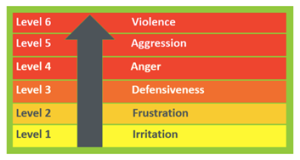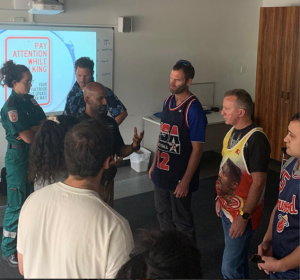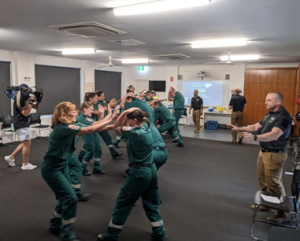Occupational Violence prevention: Train as you’re (hopefully not) going to fight!
The old adage “Train as you’re going to fight” refers to the principle of Reality-Based Training (RBT), or participating in training that is as close to replicating the real skill that will need to be performed on the day. The benefits of RBT have long been known, with the ancient Greek warrior poet Archilochus offering us the following quote:
“We don’t rise to the level of our expectations, we fall to the level of our training”
Paramedics will be very familiar with RBT for the training and skills maintenance of skills including CPR, defibrillation, intubation, and IV cannulation. I think everyone reading would agree that it would be near impossible to master any of those skills just through learning theory alone – you have to get hands-on. Likewise, the more training that a paramedic has done in simulation, the more confident they are likely to be in the real scenario, where the scene is likely to be complicated by a range of factors that add complexity and stress.
While the increasing assault rate in paramedics has long been acknowledged as an international issue (Boyle, et al., 2007), how many paramedics have actually been trained in not only the theory, but the practical aspects of recognising and managing occupational violence? Techniques such as increasing situational awareness, recognition of escalation, and de-escalation strategies have all been suggested as factors which may have prevented assault in a cohort of paramedics who had experienced occupational violence incidents (Maguire, et al., 2018).
It’s well known that simulation in any skill significantly increases performance over just learning the theory, and the good news is that it doesn’t need to be high-fidelity, expensive simulations to have that training effect (Lefor, et al., 2020). Low fidelity simulation is a cheap and easy way to program skills, and done in the right fashion can build the skills a paramedic requires to minimise their chance of assault in the workplace.
Guardian courses do exactly this – starting with an overview of techniques to improve situational awareness, recognise escalation, and learn to de-escalate aggressive behaviours, the courses quickly move into practical simulation exercises to start building the skills to react.

Through roleplay simulation of aggressive encounters, paramedics can learn to tune in to the verbal and non-verbal cues of escalation and learn the best ways to keep themselves safe regarding their distance from the aggressor, their position in the room, and situational awareness of who else might be on the scene, and the best escape route if things get violent. Remember though, these skills need to be practiced for them to be available in the high-stress situation of an escalating patient on the job when the adrenaline is pumping and we’re likely to “…fall to the level of our training”!

As an absolute last resort, Guardian also teaches practical self-defence techniques for paramedics to be able to disengage from the worst-case scenario of a physical assault. It must be stressed however, that by learning, practicing, and applying the skills of situational awareness, recognition of escalation, and de-escalation techniques, that it’s likely an assault situation can be avoided. Like most things in healthcare, prevention is definitely better than the cure!

Want to know more? Check out Guardian’s online course
online Personal Safety Training for Paramedics course
Or for further information on in-person or virtual courses, please touch base using the following email address: